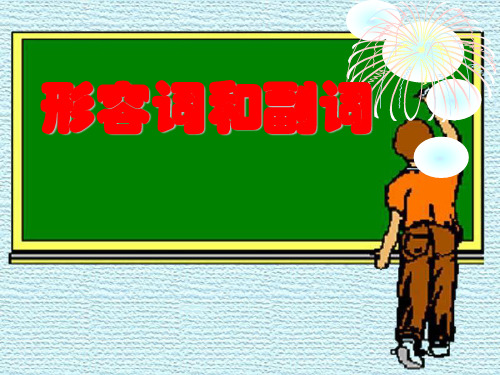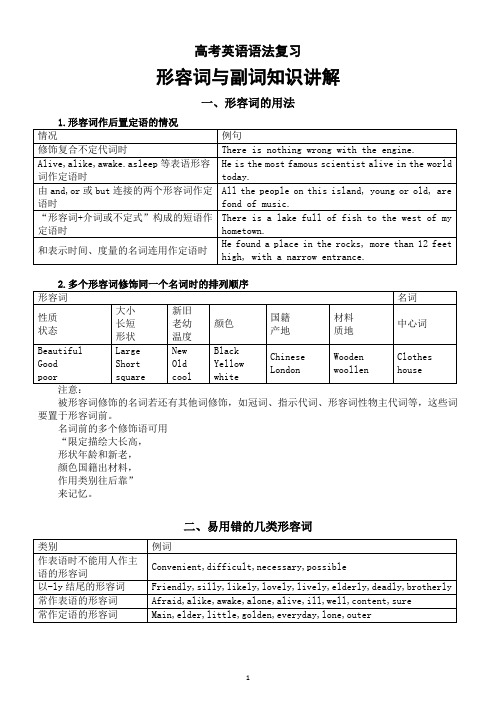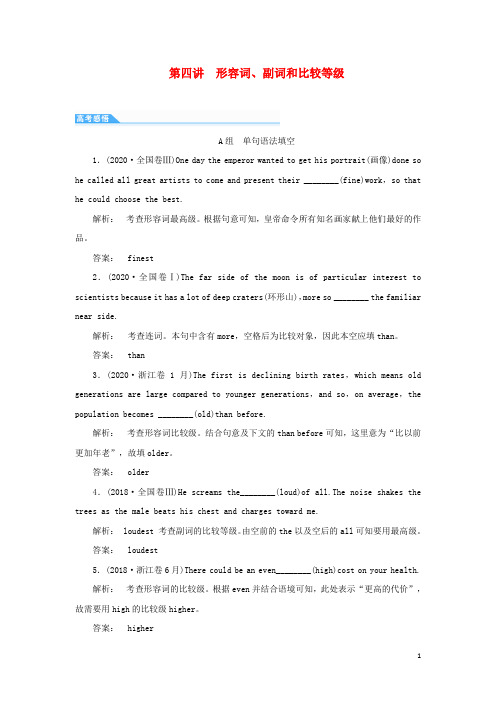语法部分 第4讲 形容词和副词
【中考英语复习之语法过关(仁爱版)】课时04 形容词 副词(教师版)

第四课时形容词和副词形容词和副词是中考的必考点,主要以“用括号中所给词的正确形式填空”的形式考查考生。
考查重点主要分布在:①形容词和副词的转换①常见形容词固定搭配①形容词和副词的比较等级①同源副词的词义辨析2.名词、动词转化为形容词的后缀饰人;以-ing结尾的形容词多表示主语所具有的特征,意为“令……的”,通常修饰物或事。
3.形容词转化为副词He made a very interesting speech last week.他上周做了一次非常有趣的演讲。
Listen to me carefully, please.请认真听我说。
1.My grandparents live (peace) in the countryside and they like the life there.【答案】peacefully此处用副词修饰谓语动词live,先把名词peace变为形容词peaceful, 再在其后加-ly构成副词peacefully。
2.At present, smart mobile phones are (wide) used in our daily lives.【答案】widely此处用副词修饰动词used,表示“广泛地”。
故填widely。
3.Douyin, which is (sudden) everywhere on the Internet, is making its way into our lives.【答案】suddenly此处用副词作状语,表示“抖音突然间在网络上随处可见”。
4.It’s (high) possible that humans have to move to Mars in the future.【答案】highly句意:很有可能人类在将来不得不搬往火星。
此处应用副词修饰形容词possible。
highly很,非常。
5.Once a week my business suit is (smooth) ironed.【答案】smoothly此处应用副词修饰动词ironed,故填smoothly,表示“平整地”。
高考英语语法复习形容词与副词 讲义

高考英语形容词与副词一、形容词(1)作定语,常用来修饰名词或代词。
These are valuable suggestions.(这些是宝贵的建议。
)I have something important to tell you.(我有重要的事情要告诉你。
)(2)作表语,放在系动词之后说明主语的情况。
His suggestions are valuable.(他的建议很有价值。
)I felt terrible this morning.(我今天早上感到不舒服。
)(3)作宾语补足语,放在宾语之后对宾语加以修饰说明。
You must keep your eyes closed.(你必须闭上眼睛。
)I find it hard to travel around the big city.(我发现在这个大城市旅行很难。
)(4)作状语,用以说明情况。
Curious, we went into the cave.(出于好奇,我们进了洞里。
)He returned home, safe and sound.(他回到了家,安然无恙。
)形容词作定语时一般置于被修饰词前作前置定语,下列情况中形容词通常后置于被修饰词。
(1)修饰something,anybody,nobody,anything等复合不定代词时There is nothing wrong with the machine.(机器什么问题都没有。
)(2)形容词词组作定语时She bought a book suitable for children.(她买了本适合孩子们的图书。
)(3)修饰表示数量的词要后置The baby is only five months old.(这个婴儿仅有五个月大。
)(4)enough作形容词修饰名词时,一般放在名词之前,也可放在名词之后We don't bring enough money.(我们没带够钱。
)There‘ll be time enough to relax when you’ve finished your work.(你完成工作后会有足够的时间来放松。
高中英语语法系列――形容词和副词

高中英语语法系列――形容词和副词[知识梳理]一、形容词的概念与用法形容词(adjective)用以修饰名词,表示人或事物的特征。
它可在句中充当定语,修饰名词、代词;可以作表语或宾(主)语的补足语,表示主语或宾语的状态、特征;有时也可以作状语。
如:This is a beautiful school.这是一所美丽的学校。
(作定语,修饰名词school)I have something important to tell you.我有些重要的事要告诉你们。
(作定语,修饰不定代词something)Our school is beautiful.我们学校很美丽。
(作表语)We’ll make our school more beautiful.我们要使我们的学校更美丽。
(作宾补)Our school will be made more beautiful.我们的学校将会变得更美丽。
(作主补)He got home late that night, hungry and tired.那天晚上他很迟才回来,又累又饿。
(作状语)二、副词的概念与用法副词(adverb)用以修饰动词、形容词或其它副词。
它在句中主要作状语,个别副词也可作表语、定语、或宾(主)语补足语。
He studies hard.他学习很努力。
(作状语,修饰动词)I’m terribly sorry for being late. 非常抱歉,我迟到了。
(作状语,修饰形容词)This coat fits him very well.这件上衣他穿着很合适。
(作状语,修饰副词)The people here are kind to us.这里的人对我们很好。
(作定语,修饰The people)When will you be back? 你什么时候回来?(作表语)三、形容词与副词的转换有的形容词加上ly后可转换成副词,规则如下:注意:friendly, motherly, lovely等词虽然以ly结尾,但不是副词,而是形容词。
初中英语语法之形容词,副词

初中英语语法之形容词&副词初中英语语法之形容词&副词形容词副词的原级、比较级和最高级1、分类:形容词和副词有原级、比较级和最高级三级。
2、规则变化:(1)单音节和部分双音节形容词和副词,在原级的后面加上er,est构成比较级和最高级。
a)直接加er,est :b)以重读闭音节结尾的,要双写最后一个辅音字母,后加er,est:c)以辅音字母+y结尾的,先把y改为i再加上er,est:(2)两个音节或两个以上的音节的,在原级前加more / most.3、不规则变化:原级比较级最高级good好的better更好的best最好的well好;(身体)好的,bad,badly糟糕的,糟糕地worse更糟糕的,更糟糕地;(身体)更不舒服的worst最糟糕的,最糟糕地;(身体)最不舒服的ill(身体)不舒服的many许多的(可数)more更多的;更most最多的;最much许多的(不可数);非常little少的less更少的least最少的far远的;远地farther更远的;更远地farthest最远的;最远地further进一步的(地)furthest最深刻的(地)4、形容词和副词的原级、比较级和最高级的用法:(1) 讲述某人/物自身的情况时,用原级。
基本句型是:主语(sb./sth) + 谓语动词+(very/too/so/quite/rather…) + 形容词/副词原级+….如:He is very oldnow. 他现在很老了。
They ran quitefast. 它们跑得相当快。
The weatherlooks rather bad. 天气看上去相当糟。
I am sohappy! 我是如此的快乐!☆表示两者之间没有差别时,使用句型:主语(第一个人物) + 谓语动词 + as + 形容词/副词原级 + as + 第二个人物+….如He is as excited as his younger sister. 他和他妹妹一样兴奋。
四、形容词和副词

以-ue结尾 的形容词
以-l结尾 的形容词 以-ll结尾 的形容词
英语
真题链接
1.The title will be (official) given to me at a ceremony in
London.(2016全国Ⅰ)
2.If you feel stressed by responsibilities at work,you should take a step back and identify(识别) those of importance.(2016全国Ⅱ) 3.Recent studies show that we are far more productive at work if we take short breaks (regular).(2016全国Ⅱ) (great) and less
英语
考点三 形容词和副词的词形变化 1.常见的形容词后缀 形容词后缀 -able -ible 意义 例词 acceptable可接受的 available可利用的 valuable有价值的 reasonable合理的 accessible可接近的 typical典型的 digital数码的 cultural文化的 environmental环境的 frequent频繁的 convenient方便的 efficient效率高的 significant有重大意义的
这两姐妹中,玛丽更聪明。
特别提示 有时形容词最高级前不用the,句中的most 相当于 very,意为“非常,十分”。 This is a most interesting stor示最高级含义
在某个特定范围内,同类事物对比,可用以下比较级结构表示最高级
英语
四、形容词和副词
英语语法之形容词副词讲解

形容词和副词一、形容词1)、⑴作定语时放在名词的前面,且音节少的词放在音节多的词之前。
如:a big yellow wooden wheel(一个黄色的大木轮)⑴作表语时放在连系动词之后。
如:The price sounds reasonable.(这个价格听起来算是合理)⑴作宾语补足语时放在宾语之后。
如:We must try our best to keep our environment clean.(我们必须尽力保持我们的环境清洁)⑷后置的情况:⑴修饰复合不定代词时放在代词之后。
如:Something important 一些重要的事情⑴与表示“长、宽、高、重、老、远离”的词连用时形容词后置。
如:He’s 1.8 metres tall.(他身高1.8米。
)二、副词(1)作状语1.时间副词:一般放在句首或句尾,注意,early、late、before、later、yet等一般放在句尾,already、just一般放在动词的前面。
如:We will visit the Great Wall tomorrow.(我们明天要去参观长城) /2.地点副词:一般放在句尾,但here、there还可放在句首。
如:There you can see thousands of bikes running in all directions(方向).3.方式副词:一般放在行为动之后,suddenly可以放在句首、句尾或动词之前。
如:Old people can hardly walk as quickly as young people.(老年人几乎不可能走得和年轻人一样快) / Suddenly he saw a light in the dark cave(山洞).(突然,在黑黢黢的山洞里,他看见了一丝亮光)4.程度副词:修饰动词时,放在动词之前;修饰形容词或副词时,放在形容词或副词之前。
但注意,enough总是放在被修饰的形容词或动词的后面;only位置比较灵活,总是放在被修饰的词的前面。
语法——形容词与副词

语法——形容词与副词第4讲形容词与副词形容词主要用来描写或修饰名词或代词,表示人或事物的性质、状态、特征、或属性。
副词是用来修饰动词、形容词、其他副词或整个句子,表示时间、地点、方式、程度、动作、频度等。
核心考点01 考查形容词和副词的基本用法当设空处所给的词是名词或动词时,如果所填的词作定语、表语、补语,表示事物的特征,需要考虑用形容词形式;当设空处是形容词时,如果所填的词修饰动词、形容词、其他副词、介词短语、名词短语或整个句子,表示时间、地点、方式、程度、动作、频度等,需要考虑用副词形式。
典例分析(2017全国卷Ⅱ)The Central London Railway was one of the most ________ (success) of these new lines, and was opened in 1900.【解析】句意:伦敦中部铁路是这些线路中最成功的一条,于1900年开通。
根据前面的the most可知, 这里是形容词的最高级, success是名词, 其形容词形式是successful。
【答案】successful状元提醒核心考点02考查形容词和副词的比较等级绝大多数形容词和副词都有三种形式:原级,比较级和最高级,用以表示形容词和副词在程度上的不同。
同级比较用“as + adj. / adv.+as”结构;其否定形式可用“not as / so + adj. / adv. + as”结构。
比较级用于两个人或事物的比较,用“比较级+than+对比成分”构成。
最高级用于两个以上的人和物进行比较,其结构形式为“the+最高级+of / in+比较的范围”。
但是,在很多情况下,比较等级的概念是暗含在上下文的语境中的,因此,考生在作答时一定要特别注意。
典例分析The purpose of new technologies is to make life ________ (easy), not to make it more difficult.【解析】句意:新技术的目的是使生活更容易,而不是使之更困难。
小学英语语法——形容词与副词知识点讲解+练习

形容词和副词一、形容词、副词概述1、形容词定义:形容词(adjective),简称adj,用来修饰名词或代词,表示人或事物的性质、状态和特征。
2、副词定义:副词(adverb),简称adv,用来修饰动词、形容词或副词,表示时间、频率、范围、语气、程度等。
二、形容词、副词考点纵览三、综合练习( ) 1. How beautifully she sings! I have never heard _____ voice.A. a betterB. a bestC. the betterD. the best ( ) 2. She looks very _____ but I can’t remember her name.A. similarB. familiarC. friendlyD. strange ( ) 3. Children all looked _____ at the broken model plane and felt quite _____.A. sad; sadB. sadly; sadlyC. sad; sadlyD. sadly; sad( ) 4. The child dreamed that he had once lived in a _______ house in the forest.A. wooden pretty littleB. little pretty woodenC. pretty little woodenD. wooden little pretty( ) 5. ---Which team is _______ to win the game?---I don’t know, but I’ve found _______ for ours to win.A. probable; it unlikelyB. likely; it possibleC. possible; it possibleD. likely; it possibly( ) 6. With the development of the Internet, _______ communication is done by regular mail.A. lessB. moreC. littleD. few( ) 7. ---If you don’t like the red coat, take the blue one.---OK, but do you have ______ size in blue? This one’s a bit tight for me.A. a bigB. a biggerC. the bigD. the bigger( ) 8. If there were no examinations, we should have ______ at school.A. the happiest timeB. a more happier timeC. much happiest timeD. a much happier time( ) 9. This dress is prettier, but it costs ______ that one.A. twice more thanB. twice as much asC. as much twice asD. twice so much as( ) 10.________students are required to take part in the boat race.A. Ten strong young ChineseB. Ten Chinese strong youngC. Chinese ten young strongD. Young strong ten Chinese( ) 11. Allen had to call a taxi because the box was ____to carry all the way home.A. much too heavyB. too much heavyC. heavy too muchD. too heavy much( ) 12. Our neighbor has ________ours.A. as a big house asB. as big a house asC. the same big house asD. a house the same big as( ) 13. We were in ________when we left that we forgot the airline tickets.A. a rush so anxiousB. a such anxious rushC. so an anxious rushD. such an anxious rush( ) 14. ---I was riding along the street and all of a sudden, a car cut in and knocked me down.---You can never be ________careful in the street.A. muchB. veryC. soD. too( ) 15. ---You don’t look very ________.Are you ill?---No,I’m just a bit tired.A. goodB. wellC. strongD. healthy( ) 16. Four of Robert’s children were at the party,including ________, Luke.A. the eldestB. an oldest oneC. the oldD. an old one( ) 17. Many students signed up for the ________race in the sports meeting to be held next week.A. 800-metre-longB. 800-metres-longC. 800 metre lengthD. 800 metres length( ) 18. It’s always difficult being in a foreign country,________if you don’t speak the language.A. extremelyB. naturallyC. basicallyD. especially。
高中英语语法讲解--形容词和副词

这类词还有: well,unwell,ill,faint,afraid,alike,alive,alone,asleep,awake 等。
3)形容词作定语修饰名词时,要放在名词的前边。但是如果形容词修饰以-thing为字尾的词语时,要放在这些词之后,例如:
以不发音的e结尾 nice(好的) nicer nicest
的单音词和少数 large(大的) larger largest
以- le结尾的双 able(有能力的) abler ablest
音节词只加-r,-st
以一个辅音字母 big(大的) bigger biggest
2) 叙述形容词只能作表语,所以又称为表语形容词。这类形容词没有级的变化,也不可用程度副词修饰。大多数以a开头的形容词都属于这一类。例如:afraid 害怕的。
(错) He is an ill man.
(对) The man is ill.
(错) She is an afraid girl.
答案A. 几个形容词修饰一个名词,他们的排列顺序是:年龄,形状,大小+颜色+来源+质地+用途+国家+名词。
3) ---- How was your recent visit to Qingdao?
---- It was great. We visited some friends,and spent the ___days at the seaside.
4. 形容词和副词
4.1 形容词及其用法
形容词修饰名词,说明事物或人的性质或特征。通常, 可将形容词分成性质形容词和叙述形容词两类,其位置不一定都放在名词前面。
形容词和副词英语语法讲解

• 1.She is my best firend ,so I know her very __
• A.good B .fine C.nice D.well
• 解析D本体考察的是形容词修饰名词。副词修饰动词的用 法本句意思是他是我的好朋友,因此我很了解他本句要修 饰是动词故用副词well
四、形容词和副词的比较等级
2. This building looks not so (as) high as that one.
3. This room is three times as large as that one.
比较级 1. 构成形式: - er more
注意不规则变化
more worse less
better farther further
原级
1. 肯定
2. 否定 3. 倍数源自as + adj. / adv. 原级 + as
not as (so) + adj. / adv. 原级 + as 倍数 + as + adj. / adv. 原级 + as
•
twice a larger than
倍数+ the size (height, length, width) + of 如:1. Mr. Sun speaks English as fluently as you.
• “…得多”:many, much, a lot, far, by far • “更,甚”:even, still
4. 比较级句型表达最高级含义 + any other + 单数名词
比较级 + the other + 复数名词 + any of the other + 复数名词
高中英语语法-形容词和副词讲解

(3) tall与high: Tall 指身高的高度,用于人和动物, 反义词为short He is very short/tall.
High 指物体的高度,另可形容价格,质量等, 反义词 为low
The kite is flying very high.
Tall和high都可用来指tree, building, tower等, 但mountain只能用high形容。
(4) too much与much too:
too much表示“太多的”,修饰事物数量; much too表示“太过,过分”,修饰形容词或副词: I am full because I have had too much rice. That coat is much too dear.
形容词的功能及位置:
(一)作定语
1.前置定语 (1)形容词作定语一般需放在它所修饰的名 词之前并尽量靠近被修饰的词。在这种位置上 的定语叫前置定语。语序一般为“冠词(或其 他限定词)+形容词+名词”。 He is an honest boy.
(2)若有多个形容修饰名词,它们的位置要由它们与
副词就是修饰或限制动词或形容词作用、表程度或范 围的词
举例:
1.Chinese, glass, a, beautiful, table a beautiful Chinese glass table 2.wonderful, my, garden, new, large my wonderful large new garden 3. a, round, table, small a small round table 4. a, old, dirty, brown shirt a dirty old brown shirt
高三英语语法总复习——形容词和副词

2)有些以-ly 结尾既为形容词,也为副词。 daily,weekly,monthly,yearly,early The Times is a daily paper. It is published daily.
1.There are some (dead )leaves on the ground. 地上有些枯叶。
2.The terrorist's attack caused more than three hundred (death).
恐怖分子的袭击造成了3百人的伤亡。
3.The roar of the explosion was followed by a (deathly) silence.
interesting because of its association with persons or events in history: 具有历史意义的首次太空旅行。而且也 用于形容那些因与历史事件或人物有联系而有名或有趣的事物:
a historic house. Historicalrefers to whatever
3. worthwhile 可作表语和定语 It is worthwhile to do或 It is worthwhile doing
dead --- deadly --- deathly
dead adj.死的, 无感觉的, 呆板的, 不流动的, (语言、习惯)废 弃了的, 熄灭的 n.死者 adv.完全地, 绝对的, 突然的 death n.死, 死亡, 致死的原因, 毁灭, 屠杀 deadly adj.致命的, 势不两立的, 死一般的, 极度的, 必定的 deathly adj.死一般的 adv.象死一样地
形容词和副词

形容词和副词形容词和副词是英语语法中非常重要的词类,它们用于描述人、事物的特征和行为方式。
形容词主要修饰名词,而副词则修饰动词、形容词和其他副词。
在本文中,我们将探讨形容词和副词的特点、用法以及常见的例子。
一、形容词形容词是用来描述名词的词类,它可以通过在名词前面进行修饰来表达特征和性质。
形容词通常用于以下几种情况:1. 描述名词的外观和形状:beautiful(美丽的)、round(圆的)、tall(高的)等。
2. 描述名词的颜色:red(红的)、blue(蓝的)、yellow(黄的)等。
3. 描述名词的大小:big(大的)、small(小的)、huge(巨大的)等。
4. 描述名词的品质和特征:kind(善良的)、intelligent(聪明的)、brave(勇敢的)等。
5. 描述名词的情感和感觉:happy(快乐的)、sad(悲伤的)、excited(兴奋的)等。
形容词的用法要根据所修饰名词的单复数、定冠词和限定词等进行相应的变化。
例如:- The beautiful flowers filled the garden with colors.(美丽的花朵将花园装点得五彩斑斓。
)- I saw a big house on the top of the hill.(我看到一座大房子位于山顶上。
)- She is a kind and intelligent girl.(她是一个善良而聪明的女孩。
)二、副词副词用于修饰动词、形容词和其他副词,它可以表示时间、地点、方式、程度等。
副词通常用于以下几种情况:1. 描述动词的方式和动作:slowly(慢慢地)、quickly(快速地)、carefully(小心地)等。
2. 描述形容词的程度:very(非常)、quite(相当)、extremely(极其)等。
3. 描述地点和方向:here(这里)、there(那里)、upstairs(楼上)等。
4. 描述时间:today(今天)、tomorrow(明天)、soon(很快)等。
形容词和副词教案及反思

形容词和副词教案及反思教案形容词和副词是英语语法中十分重要的两个部分,它们的作用非常广泛。
形容词用于描述和修饰名词,使我们更加生动形象地理解事物;而副词则用于修饰动词、形容词、副词等,具有明确的修饰作用。
一、教学目标1.让学生了解和掌握形容词和副词的定义及作用。
2.让学生学会区分形容词和副词的用法及语法规则。
3.让学生会运用常见的形容词和副词,丰富自己的语言表达。
二、教学内容(一)形容词和副词的定义及作用形容词:用于修饰名词,描述事物的属性、特征等。
例如:A beautiful girl一个美丽的女孩子这里,“beautiful”就是一个形容词,用于修饰“girl”。
副词:用于修饰动词、形容词、副词等,具有明确的修饰作用。
例如:She sings well.她唱得很好。
这里,“well”就是一个副词,用于修饰“sings”。
(二)形容词和副词的用法及语法规则1.形容词的比较级和最高级:英语中一般存在三种级别分别是原级、比较级和最高级,用于描述事物的不同程度。
形容词的比较级和最高级通常是加“er”和“est”或者在形容词前加“more”和“most”来表示。
例如:短小(short)-> 更短小(shorter)-> 最短小(shortest)有趣(interesting)-> 更有趣(more interesting)-> 最有趣(most interesting)2.副词的用法:(1)修饰形容词或副词:形容词的比较级和最高级也可以用副词来修饰,通常在形容词或副词前加上“more”和“most”。
例如:快(fast)-> 更快地(faster)-> 最快地(fastest)强(strong)-> 更强地(stronger)-> 最强地(strongest)(2)修饰动词:例如:He runs quickly.他跑得快。
这里,“quickly”就是一个副词,修饰“runs”。
高中英语2025届高考语法复习形容词与副词知识讲解

高考英语语法复习
形容词与副词知识讲解
一、形容词的用法
被形容词修饰的名词若还有其他词修饰,如冠词、指示代词、形容词性物主代词等,这些词要置于形容词前。
名词前的多个修饰语可用
“限定描绘大长高,
形状年龄和新老,
颜色国籍出材料,
作用类别往后靠”
来记忆。
二、易用错的几类形容词
三、形容词的比较等级
English is as interesting a subject as Chinese.
Which is the better of the two watches?
She is the taller of the two girls.
other或else把主语排除在比较对象之外;但如果不在同一范围比较则不需要用。
Susan is taller than any girl in her sister’s class.
四、副词的句法功能
五、副词的位置
六、副词比较等级的用法。
第4讲 形容词和副词

改正下列句中的错误 1. I have to stay at home to look after my ill mother, who caught a bad cold the other day. 【答案】 ill改为sick。ill表示“生病的”意思时,只 用作表语形容词,不能作定语。ill后接名词,表达 “邪恶的,品德败坏的”意思。my ill mother意为 “品德败坏的母亲”。
第4讲
形容词和副词
一、形容词
1
什么是形容词?
翻译下列句子,指出句中的形容词 1. Good news keeps pouring in. 【答案】捷报频传。句中形容词为good。
2. Thought without learning is dangerous.
【答案】思而不学则殆。句中形容词为dangerous。
1
形容词是用来修饰名词或代词,表示人或事物的 性质、状态和特征的词。
2
形容词在句中充当什么成分?
指出下列句中的形容词,并指出其在句中的成分。 1. A timely snow promises a good harvest.
瑞雪兆丰年。
【答案】 timely 和good 均为定语。 2. Impossible is nothing.没有不可能。 【答案】 impossible 为表语(注意该句为倒装句)。
4
2. The number of the present students is half of the total.That's to say, half of them are absent. 【答案】present放students后。意为“出席的/到场 的”。
4
通常只用作表语,不能作定语的形容词叫表语形 容词,少数表语形容词作定语只能作后置定语。这 类词 以 a 开头 的 较多 。 如:alike ,asleep, awake, afraid。
高中英语语法系统讲解之四形容词和副词

高中英语语法系统讲解之四形容词和副词形容词和副词形容词一. 形容词的语法功能形容词用来修饰名词或代词,表示人或事物的性质、状态或特征。
在句中作定语、表语、宾语补足语以及状语。
形容词前加定冠词the,相当于一个名词。
如He is a young Russian soldier. The film is interesting.He likes to paint the wall pink. Lucy came to the party, happy.The blind are taught how to do the work.温馨提示:1. 有些形容词通常作表语和补语,不能像普通形容词那样作前置定语,这样的形容词称为表语形容词。
如alive, alone, asleep, alike, afraid, awake, ashamed, able, sure, ill, worth等;其作定语时后置。
2. 有些形容词只能作定语,不能作表语,这样的形容词称为定语形容词,如golden, wooden, silken, live, elder, former, latter, front, back, outer等二. 形容词的分类1. 性质形容词○1外观:long, strong, big, round, fat, beautiful, old等○2性质:good, clean, new, fresh, soft, excellent等○3颜色:red, black, green, blue, white, brown等○4情绪:happy, sad, sorry, nervous, anxious等○5性格:kind, cruel, honest, foolish, lazy, rude等○6状况:careful, blind, deaf, cheap, hungry等○7评论:great, true, necessary, difficult, wrong等2. 关系形容词○1地域:Chinese, American, Asian, Pacific 等○2质料:wooden, golden, plastic, metallic 等○3科技:electric, chemical, atomic,medical等○4意识:communist, social, political, religious等○5行业:industrial, agricultural, economic, military等三. 形容词在句中的位置1. 单个形容词作定语时,一般放在被修饰的名词之前;两个或两个以上的形容词修饰一个名词时,同种类形容词的排列顺序一般应考虑以下两种情况:○1和被修饰的名词关系比较密切的形容词位置更靠近名词。
《中考语法完全突破记忆大纲》第4讲:形容词和副词

第四讲:形容词和副词一.形容词1. 语法意义表示人或事物的属性或性质,通常用于修饰、限制或说明名词。
如:a book→ a good book, a car →a red cara girl →a beautiful girl,a man →a strong man2. 形容词的功能(1) 作定语(修饰名词说明其性质或特征)如:This is a difficult problem.I have a happy family.(2) 作表语(与连系动词构成系表结构说明主语的性质或特征)如:The dog is lovely.Lily’s dress is beautiful.(3) 作宾语补足语(说明宾语的性质状态或特征)如:I found the book interesting.His words made me angry.3. 形容词作定语时的位置(1) 单个形容词作定语时,通常置于其所修饰的名词前。
如:a black bag(2) 修饰some, every, no与thing及body构成的不定代词时,形容词需后置。
如: There is nothing important.(3) enough作形容词修饰名词时,通常置于名词前,但在一些特别的结构中也可用于名词后。
如:We haven’t got enough time.There will be time enough for that later.注意:enough作副词时需置于其所修饰的词后。
如: big enough(4) alive (活着的), alone(只有,仅仅), present(在场的), else(其他的), here, there 等必须放在被修饰名词的后面。
如:Man alone has the ability to speak. (只有人类有说话的能力。
)(5)形容词短语用作定语时通常后置。
如:All the people young and old are against the plan.4. 多个形容词修饰同一名词时的排列顺序。
高考英语一轮复习语法部分专题二第四讲形容词副词和比较等级学案北师大版

第四讲形容词、副词和比较等级A组单句语法填空1.(2020·全国卷Ⅲ)One day the emperor wanted to get his portrait(画像)done so he called all great artists to come and present their ________(fine)work,so that he could choose the best.解析:考查形容词最高级。
根据句意可知,皇帝命令所有知名画家献上他们最好的作品。
答案:finest2.(2020·全国卷Ⅰ)The far side of the moon is of particular interest to scientists because it has a lot of deep craters(环形山),more so ________ the familiar near side.解析:考查连词。
本句中含有more,空格后为比较对象,因此本空应填than。
答案:than3.(2020·浙江卷1月)The first is declining birth rates,which means old generations are large compared to younger generations,and so,on average,the population becomes ________(old)than before.解析:考查形容词比较级。
结合句意及下文的than before可知,这里意为“比以前更加年老”,故填older。
答案:older4.(2018·全国卷Ⅲ)He screams the________(loud)of all.The noise shakes the trees as the male beats his chest and charges toward me.解析:loudest 考查副词的比较等级。
- 1、下载文档前请自行甄别文档内容的完整性,平台不提供额外的编辑、内容补充、找答案等附加服务。
- 2、"仅部分预览"的文档,不可在线预览部分如存在完整性等问题,可反馈申请退款(可完整预览的文档不适用该条件!)。
- 3、如文档侵犯您的权益,请联系客服反馈,我们会尽快为您处理(人工客服工作时间:9:00-18:30)。
第4讲形容词和副词(要点透析)一、注意形容词和副词的基本用法形容词在句中一般作定语(修饰名词)、表语、补语。
a beautiful park 一座美丽的公园The play Tea-house is both moving and interesting.Who left the window open?而副词在句中主要作状语,用来修饰形容词、副词、动词和句子。
completely right 完全正确very carefully 非常仔细He went to bed late last night.他昨晚很晚才睡觉。
Luckily,I was not knocked down.幸运的是,我没有被撞倒。
【特别注意】系动词后的表语应该用形容词。
The boy looks sad.男孩子看起来很伤心。
The boy looks sadly at me.男孩子悲伤地看着我。
形容词若作状语,表示主语所处的状态。
He finally came back, safe and sound.他最终回来了,安然无恙。
二、形容词的位置1.单个形容词作前置定语,但在下列情况作后置定语。
①形容词修饰不定代词时。
There is nothing new in today's newspaper.②当表语形容词alone,awake,alive,asleep,alike等作定语时。
The people, and the people alone, are the motive force in the making of world history. 人民,只有人民,才是创造历史的动力。
③else常用作疑问代词和不定代词的后置定语。
What else do you know?你还知道别的什么?2. 形容词构成短语时作后置定语。
A man carried a bag full of rice on his back.The enemy took away everything, useful or useless.3.多个形容词的排序。
原则:关系最密切的形容词,最靠近被修饰的名词。
常见顺序归纳为如下口诀:限定描绘大长高,形状年龄与新老,颜色国籍出材料,作用类别往后靠。
即:限定词(冠词、代词、数词等)+描绘性形容词(beautiful, interesting…)+大小、长短、高低形容词+形状、年龄、新旧形容词+颜色、国籍、出处、材料形容词+用途、类别形容词+中心名词。
a big round conference table 一张大的圆会议桌a small shiny black leather handbag 一只小的闪亮的黑色皮包a blue German sports car 一辆蓝色德国赛车her charming small round pink face 她的迷人的红润的小圆脸三、副词的位置1. 副词修饰形容词和副词时,应放在被修饰的词之前,但enough,nearby必须置于其后。
This book is quite interesting.这本书是很有趣的。
The boy is old enough to go to school.这男孩已够大,可以上学了。
2. 频度副词(always, often, usually, never, seldom, hardly, sometimes等)要放在实义动词之前,be动词、助动词、情态动词之后。
Children often go to the park with their parents on Sundays.在星期天孩子们经常和他们的父母去公园。
He is always ready to help others.他总是乐于助人。
I will never forget that day.我永远也忘不了那天。
3. 同时出现的不同种类的副词排列顺序一般为:状态或程度+地点+方式+频度+时间;但要突出某一状语时,可以将它提前。
Mr. Brown drove his car quickly outside then.布朗先生那时在外面开着快车。
You always study very hard here this term.这学期你总是在这里努力学习。
Yesterday, they worked very hard in the fields.昨天,他们在地里辛勤地劳作着。
4. 修饰全句的副词多置于句首,作评注性状语。
Fortunately, he was not drowned and was saved by the PLA men.幸运的是,他没有被淹死而是被解放军救了起来。
Happily for her, her stepmother was kind to her.对她来说非常幸运的是,她的继母对她很好。
【疑难点击】1. 注意常用同义与近义形容词、副词在表达中的语义差别。
①ago与beforeago表示以现在为起点的“以前”;before指以过去或将来的某时刻为起点的“以前”。
泛指“以前”用before而不用 ago。
【疑难点击】②good与well与good不同的是,well作形容词,只能在系动词后作表语,表示“身体状况好”,也作副词修饰动词。
③real与truereal强调真实存在的而不是幻想的,在句中常作定语;true指与事实标准和实际情况相符合,在句中作表语或定语。
2.以“-ly”结尾的词性辨析。
①下列单词以“-ly”结尾,但却是形容词而非副词:lively, lonely, lovely, deadly, friendly, ugly, silly, likely, brotherly, timely 等。
②表原意(无“-ly”)和引申意(有“-ly”)的副词:close近, closely 仔细地late晚, lately最近deep深,表示空间深度,deeply表示感情上的深度,深深地wide表示空间宽度,widely广泛地free免费,freely 无限制地③有无“-ly”意义大不相同的副词:dead完全,绝对be dead asleepdeadly非常be deadly tiredpretty相当be pretty certain that…, pretty goodprettily漂亮地be prettily dressedmost 最 mostly主要地;绝大多数3. 通常用“事物”作主语的形容词。
(im)possible,(un)necessary,(im)probable,(in)convenientCome and see me whenever it is convenient to you.4. 注意某些分词转化而来的形容词。
表示情感类的过去分词表示心理状态,而现在分词则表示性质,令人……frightened 感到害怕的frightening 令人害怕的The frightening noise made the girl too frightened to move.这个可怕的声音令女孩感到非常害怕,以致不敢动。
另注意这些分词形容词 remaining,promising,demanding,missing, gone,lost,seated,drunk等。
She was the more promising worker of the two.5.复合形容词的构成由两个或两个以上不同词类,其间用连字符连接,构成复合形容词。
①形容词+名词-edmiddle-aged 中年的warm-hearted 热心肠的②名词+过去分词man-made 人造的③名词+现在分词English-speaking 讲英语的④名词+形容词life-long 终生的⑤形容词+现在分词good-looking 好看的⑥副词+现在分词hard-working 勤劳的⑦副词+过去分词well-known 著名的⑧数词+名词+形容词twelve-year-old 12岁的四、形容词、副词比较级句型1. 同级比较:as…as…,the same as, such…as…,not as(so)…as…①as…as 之间一定要用形容词或副词原形。
I am as old as you.我和你年龄一样大。
Tom works as hard as Mary.汤姆和玛丽工作一样努力。
②so用以替代第一个as时,只能用于否定句。
John is not as/so clever as Jack.约翰不像杰克那样聪明。
He doesn't read as/so clearly as she.他读得不像她那样清楚。
③as+adj.+不定冠词+可数名词单数+asas+adj.+不可数名词+asGerman is as difficult a language as English.Bread is as important food as rice.2. 比较级+than的句型。
①比较级前可用much,far,a lot,a little,a bit,rather,even,still,a great deal 等表示程度,但比较级前不能再用more。
She sings far/much better than the others.她唱得比别人好得多。
Your book is far/much more interesting than his.你的书要比他的书有趣得多。
②表示不同程度比较时,句子主语不能包括在比较对象的范围之内。
他比班上其他学生学习用功。
(他本身也是学生不能用any students来表示比较对象的范围)③比较级用于否定句中表示最高级的意思。
There is no greater love than that given by parents in the world.父母之爱,是世间最伟大的爱。
3.最高级句型(只用于三者或以上的比较)①最高级可用by far,easily,nearly,by no means, 序数词等修饰,置于最高级之前。
He is the second tallest boy in our class.②“否定词语+比较级”,“否定词语+so…as”结构也可以表示最高级。
Nothing is so easy as this.=Nothing is easier than this./This is the easiest thing.没有比这更简单的了。
It can't be worse.不可能更糟糕了。
4. 一些固定习惯用语与句型。
①“the+比较级……,the+比较级……”结构,意为“越……,越……”。
